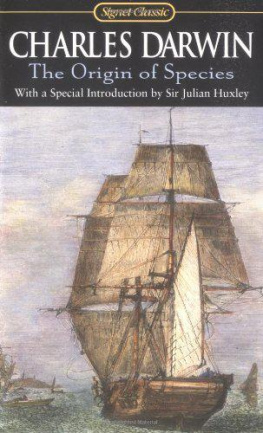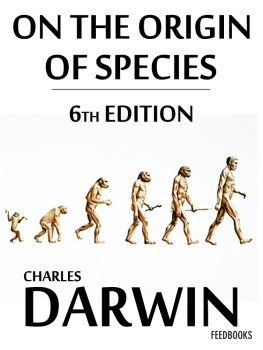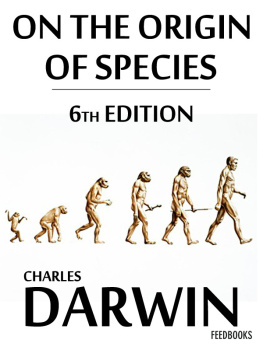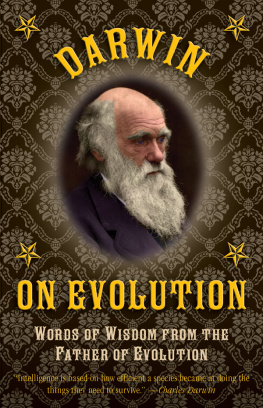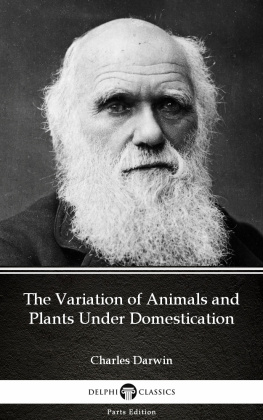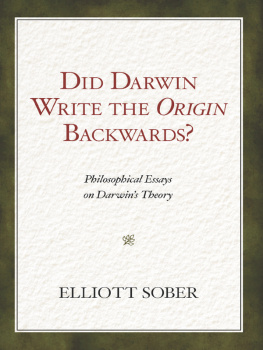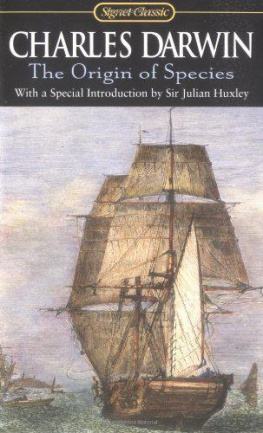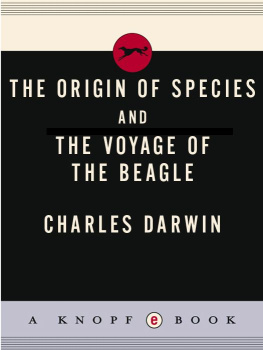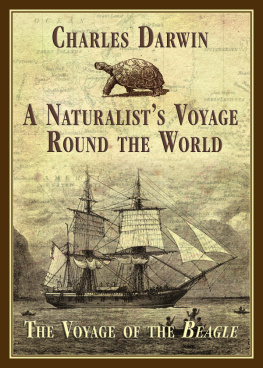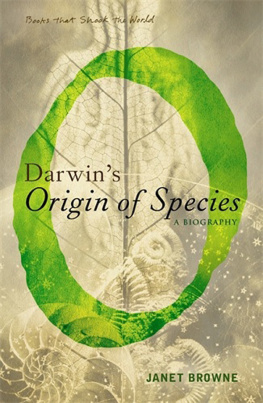Table of Contents
THE THEORY THAT SHOOK THE WORLD
Few other books have created such a lasting storm of controversy as The Origin of Species. Darwins theory that species derive from other species by a gradual evolutionary process and that the average level of each species is heightened by the survival of the fittest stirred up popular debate to a fever pitch. Its acceptance revolutionized the course of science.
As Sir Julian Huxley, the noted biologist, points out in his illuminating introduction, the importance of Darwins contribution to modem scientific knowledge is almost impossible to evaluate: a truly great book, one which after a century of scientific progress can still be read with profit by professional biologists.
Darwin was one of historys towering geniuses and ranks with the greatest heroes of mans intellectual progress.
George Gaylord Simpson in The Meaning of Evolution

SIGNET CLASSICS
Published by New American Library, a division of Penguin Group (USA) Inc., 375 Hudson Street, New York, New York 10014, USA Penguin Group (Canada), 90 Eglinton Avenue East, Suite 700, Toronto, Ontario M4P 2Y3, Canada (a division of Pearson Penguin Canada Inc.) Penguin Books Ltd., 80 Strand, London WC2R ORL, England Penguin Ireland, 25 St. Stephens Green, Dublin 2, Ireland (a division of Penguin Books Ltd.) Penguin Group (Australia), 250 Camberwell Road, Camberwell, Victoria 3124, Australia (a division of Pearson Australia Group Pty. Ltd.) Penguin Books India Pvt. Ltd., 11 Community Centre, Panchsheel Park, New Delhi - 110 017, India Penguin Group (NZ), 67 Apollo Drive, Rosedale, North Shore 0632, New Zealand (a division of Pearson New Zealand Ltd.) Penguin Books (South Africa) (Pty.) Ltd., 24 Sturdee Avenue, Rosebank, Johannesburg 2196, South Africa
Penguin Books Ltd., Registered Offices: 80 Strand, London WC2R ORL, England
Published by Signet Classics, an imprint of New American Library, a division of Penguin Group (USA) Inc. Previously published in a Mentor edition.
First Signet Classics Printing, September
Introduction copyright New American Library, a division of Penguin Group (USA) Inc., 1958
All rights reserved

REGISTERED TRADEMARK-MARCA REGISTRADA
eISBN : 978-1-101-12675-2
The scanning, uploading and distribution of this book via the Internet or via any other means without the permission of the publisher is illegal and punishable by law. Please purchase only authorized electronic editions, and do not participate in or encourage electronic piracy of copyrighted materials. Your support of the authors rights is appreciated.
http://us.penguingroup.com
INTRODUCTION BY SIR JULIAN HUXLEY
IT is APPROPRIATE that this new edition of The Origin of Species should appear during the centenary year of Darwin and Wallaces joint paper at the Linnaean Society (July 1, 1858), for it was the bombshell of Alfred Russel Wallaces independent discovery of the principle of natural selection which stimulated Darwin to publish his book. He had been convinced of the mutability of specieswhat we should now call their evolutionby his experiences on H.M.S. Beagle and had been collecting facts bearing on the subject since 1837. But his cautious, and almost diffident, temperament held him back from publishing his conclusions (whose acceptance, he fully realized, would mean a revolution in scientific and general thought) until he could support them with adequate facts. Indeed, it was not until 1842 that he allowed himself the satisfaction of writing out a brief thirty-five-page abstract of his theory. Two years later he enlarged this into an Essay (though an essay of 230 pages), which is really a first draft of the Origin. However, he showed this only to Lyell and Hooker (and corresponded about his conclusions with Asa Gray). For fifteen further years he went on elaborating his ideas and collecting facts in support of them, with a view to publishing a truly convincing worka very big book, as perfect as ever I can make it; and if it had not been for Wallaces moment of inspiration in Ternate, when the idea of natural selection flashed into his fever-stimulated brain, Darwin might well have continued doing so for another fifteen years, and the resultant book might have been unreadably monumental.
As it is, the Origin was written in the short space of little over a year, and was the product of a white heat of urgency working on the fruits of twenty-two years industry and reflection. It is interesting to note that even as Darwin presented the manuscript to his publisher, his characteristic wariness did not leave him. He wrote to John Murray: Accept your offer. But I feel bound for your sake and my own to say in clearest terms that if after looking over part of the MS you do not think it likely to have a remunerative sale I completely and explicitly free you from your offer.
Such was his comment accompanying the emergence of a truly great book, one which after a century of scientific progress, can still be read with profit by professional biologists.
Why is The Origin of Species such a great book? First of all, because it convincingly demonstrates the fact of evolution: it provides a vast and well-chosen body of evidence showing that existing animals and plants cannot have been separately created in their present forms, but must have evolved from earlier forms by slow transformation. And secondly, because the theory of natural selection, which the Origin so fully and so lucidly expounds, provides a mechanism by which such transformation could and would automatically be produced. Natural selection rendered evolution scientifically intelligible: it was this more than anything else which convinced professional biologists like Sir Joseph Hooker, T. H. Huxley and Ernst Haeckel.
In neither case did Darwin shrink from drawing the most general conclusions. To begin with, he realized that evolution must be a universal phenomenon. If different species of groundfinches or armadillos could be produced by evolution from a common ancestor, then, given enough time, the same must hold for different families, orders, and classes and for the diversity of life as a whole: all living organisms must be related through their common descent from some simple original stock. Further, since all organisms vary, and all reproduce themselves in greater numbers than can survive, there must always be competition between variants; in other words, the principle of natural selection, too, is universally applicable.
For these reasons, Wallace himself rightly styled Darwin the Newton of Natural History, or, as we should now say, of Biology. Each introduced the ideas of unity, order, and universally applicable principle into an enormous realm of experience.
In 1859, the area of biological ignorance was very large. Nothing was known of the mechanisms of fertilization, heredity and variation, nor of embryonic differentiation; the scientific study of animal behaviour, biogeography and ecology had scarcely begun; no good paleontological series, like those of horse or elephant evolution, had been discovered, nor any fossils bearing on the ancestry of man; and the time-scale admitted by geologists and physicists was grossly inadequate. Yet in spite of this, Darwin in the Origin gave a remarkably good general picture of the evolutionary process, and followed out the implications of natural selection in a quite astonishing way.
Thus he deduced that natural selection must inevitably bring about the improvement of organisms, improvement which, as he characteristically added, was always in relation to the conditions of life. This, though he did not himself claim it, was in fact another universal biological law, covering detailed adaptations to particular circumstances (like the resemblance of leaf insects to leaves), specializations for a particular mode of life (like that of the horses for rapid running and grazing), advances in efficiency of major functions (like flight, or vision, or co-ordination of behaviour), or improvements in general organizational plan (like that of arthropods as against segmented worms, or of placentals as against primitive mammals).
Next page
